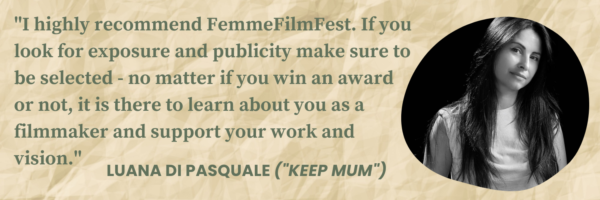Emma Seligman first made waves in the film scene in 2018 with her short film Shiva Baby, which she submitted as her thesis film, studying then as a film student at NYU. The set-up is simple, a young woman runs into her sugar daddy while attending a Jewish funeral service – a Shiva – with her parents. It’s a classic comedy step-up, with all the uncomfortable laughter and wincing, growing out of the awkwardness of the encounter, the obliviousness parents, and to complicate matters further her sugar daddy’s wife and baby showing up.
The short went on to showcase at several film festivals including the 2018 South by Southwest film. The reason for its appeal is of little surprise, it is simple but effective story confidently told, with all the charm of cinema’s best first forays into film. Most telling of all, it had the makings to be an incredibly impressive feature film.
Cut to 2020, Seligman writes and directs her debut feature of the same name. Stepping into feature one would expect Shiva Baby to be a slant rhyme of its predecessor. Of course, her debut feature carries over some of the short’s DNA: both star then newcomer Rachel Sennott in the lead role, both maintain the same premise, both are wonderfully charming. Both films begin in the same way, a young woman having sex with an older man, a sugar daddy, whose off-putting paternalism leaves her feeling no affection for him whatsoever. However, what one may not expect Shiva Baby to be, is a stomach clenching hour and seventeen minutes of its protagonist’s personal hell, an experience more akin to watching psychological horror than any aspirations of comedy.
FemmeFilmFest7 Review: Freedom Swimmer (Olivia Martin-McGuire)
It is a film beset with unmet expectation. Danielle, the eponymous shiva baby, is about to graduate from college and majoring in gender studies, to the absolute bewilderment of her parents. In fact – and despite the films sombre setting – Danielle’s parents quite loudly express their utter confusion and, at times distaste, for a great deal of her life choices. Danielle’s entire extended family are in bewilderment over her major, confused by her job prospects, baffled by her apparently non-existent love life, and frequently clutching her waist amazed at how skinny she appears to be. This is the tension core to both the horrors and successes of Seligman’s expanded premise, the weight and expectations of family bearing down on Danielle, constricting her until she has no air left to breathe.
Her parents are, however, still in the dark over her ongoing tryst with Max (Danny Deferrari), Danielle’s sugar daddy, and whom the central drama of the film unfolds around. With the narrative space afforded to her by the extended runtime, Seligman fleshes out this plot thread, previously left unresolved in the short. This time, Murphy’s Law is the modus operandi – everything that can go wrong will inevitably go wrong, with the camera intimately locked on Sennott’s anxiety riddled face.
Seligman shows her craft for storytelling, setting up an intricately placed house of cards that falls in surprising and nuanced way. Often Danielle will be trapped into a conversation, revealing her family’s confusion and low opinion of her or forcing her to tell a series of farcical lies in order to cover up her affair. Seligman’s script is finely tuned for this, layering lines of dialogue over each other as characters interrupt, ignore and overlap each other, a style of dialogue reminiscent of Noah Baumbach’s Meyerowitz Stories. What results is a cacophony of inescapable voices that Danielle can neither run nor hide from. Ariel Marx’s score comprised almost entirely of discordant staccato strings, along with cinematographer Maria Rusche’s tight close-ups, does a great deal of work to ratchet up the claustrophobic tension.
FemmeFilmFest7 Review: Hot Singles (Laura Jean Hocking)
Of course, Shiva Baby is still comedic – part comedy of errors, part comedy of manners – the film finds humour in these uncomfortable and often very familiar moments. Danielle’s overbearing mother played by Polly Draper; her clueless father who never feels like he knows what room he’s in, played by Fred Melamed; the peculiar cast of probing friends and family, all turn in memorable performances. This is not to ignore Rachel Sennott, who is a revelation, bringing an astounding amount of subtle detail to her performance, which so heavily relies on the intricacies of facial expression.
The feature also carries over some of the short’s sharply funny dialogue. Danielle arriving at the Shiva and bluntly asking ‘who died?’ or her mother referring to her as ‘Gwyneth Paltrow on food stamps’, display Seligman’s strength for character writing. What the short lacks, however, made up for in the feature is Shiva Baby’s pathos. While both films appear deeply personal, drawing from Seligman’s personal experiences growing up in a Jewish family, her feature reveals a deep warmth amid the frosty layers of familial chaos.
Though the film never veers off into mawkish territory, there is an underlying sweetness whenever Danielle shares the space with Maya (Molly Gordon), her ex-girlfriend with whom tender feelings still linger. The two have the awkward chemistry of two people that know why they shouldn’t be together but profoundly long to, nevertheless.
FemmeFilmFest7 Review: Titane (Julia Ducournau)
The film is deceptively complex for its 76-minute runtime; however, it never bites off more than it can chew, each plot thread is in its right place and relevant to the story, no scene loses its charm. In fact, the film could serve to loosen up the reigns and allow for more time with each character. However, its restraint is emblematic of a writer/director both confident about the story they want to tell and perhaps nervous about overstaying their welcome.
Shiva Baby is a small film wearing a lot of hats. It is a smart coming of age psychological horror comedy. It’s a film about what it is like to come of age and have no idea what you’re doing. It’s about Jewish culture and customs and what it is like for a young woman who does not want to be confined or constrained by it. It’s about confronting the mistakes you make when your young and it is all told compellingly by a first-time director that does not show an ounce of their newcomer status.





